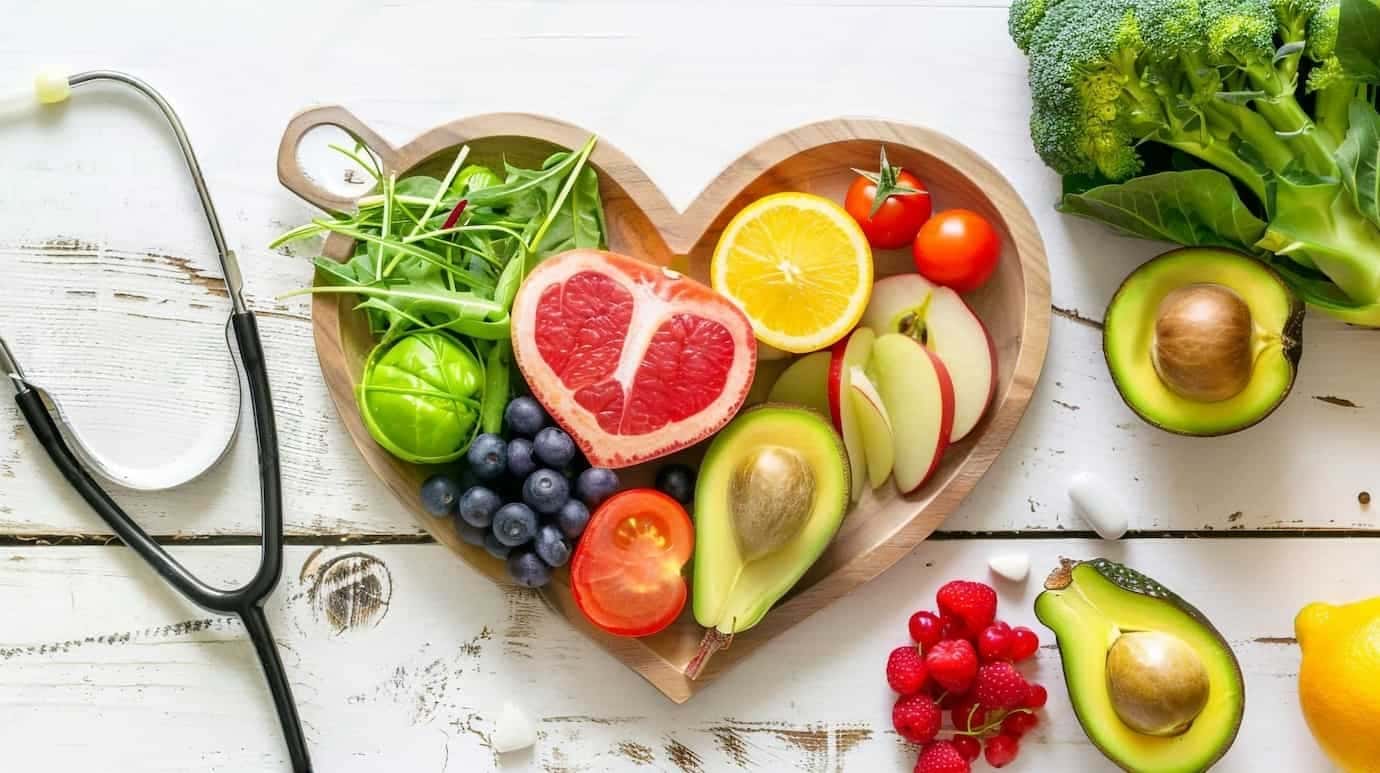Last updated on July 3rd, 2025 at 06:18 pm

Introduction
Your diet plays a significant role in managing heart health and preventing cardiovascular disease. Food groups containing trans and saturated fats, such as deep-fried foods, processed milk products and meats are bad for the heart and are best avoided. Foods high in salt content must also be avoided.
At the same time, some food groups are extremely beneficial for heart health and can be called heart-healthy foods. They are an integral part of a healthy heart diet. Here, you will get to know more about such foods that benefit your heart health.
Extra virgin olive oil
Extra virgin olive oil is frequently regarded as one of the healthiest cooking oils. It is considered the best food for the heart as it has several benefits for the cardiovascular system. It is a great anti-oxidant that protects the layer of heart vessels, reduces the oxidation of bad cholesterol and also prevents blood clotting, which in turn prevents stroke. You must include this in your healthy heart diet plan.
Whole grains like oats and barley
Whole grains are one of the most heart-healthy foods. Studies have reported that the consumption of whole grains reduces total cholesterol especially low-density lipoproteins (LDL) or bad cholesterol. Whole grains like Oats and barley in particular are found to have a beneficial effect on the heart by lowering cholesterol levels in the blood. Moreover, whole grains are nutrient-dense and rich in fibre and can be made a part of your daily healthy heart diet.
Dry fruits and nuts
Increasing your nut intake may help you maintain a healthy body weight and lower your risk of developing heart disease. Nuts like almonds, walnuts, pistachios, and macadamia nuts can be a part of a healthy heart diet. They can be incorporated into heart-healthy meals, such as salads, snacks, and smoothies. Nuts significantly lower the bad cholesterol in the body and help keep the blood sugar levels stable. They are packed with vitamins, minerals, and fibre, all of which are good for your health in general.
Fish and fish oil supplements
Fatty fish like salmon, sardine, cod and fish oil supplements are the richest source of omega-3 fatty acids, which makes them the best food for the heart. They lower blood pressure, reduce the level of triglycerides and decrease the risk of a heart attack. Include fish twice a week in your healthy-heart diet for better heart health.
Seeds like flax, chia, and hemp
Heart-healthy foods also include seeds like chia, flax, and hemp, which are rich sources of omega-3. They have anti-inflammatory properties, lower blood pressure, and protect those who have high blood pressure. In some cases, doctors may also prescribe Prestel 40mg Tablet to support blood pressure management alongside dietary changes.
If you are a vegetarian or vegan, you can include them in your healthy-heart diet. Add them to your flours, soups, and salads, or simply snack on them.
Alongside a heart-friendly diet, daily habits matter too. Choosing herbal supplements like Kushal Kanthil Tablets can support your throat and oral health naturally without the hidden sugars found in typical lozenges.
Conclusion
A healthy heart diet can bring about a significant improvement in your heart health if consumed regularly along with your medications for your underlying heart conditions. Consume whole grains, seeds, nuts, and fatty fish for a healthy heart. Green leafy vegetables, fresh fruits, legumes, pulses, and low-fat dairy are some other foods that are good for the heart. Reduce your salt intake, quit alcohol and smoking, and start exercising regularly for optimum cardiovascular health.
If you have a heart condition, you should see a cardiologist and take your medications as prescribed, in addition to following a healthy heart diet.
For your medicines, visit Medkart, India’s most trusted generic medical store that offers low prices on top-notch generic drugs. Find out more about your medicines on Medkart | Generic Medicines Online – Best Online Pharmacy App and compare the costs of your prescription drugs there.
FAQs
1. Which type of diet is best for maintaining heart health?
Heart-healthy foods include those that are low in trans and saturated fat and are nutrient-dense, such as whole grains, legumes, fruits, vegetables, fatty fish, seeds and nuts. Include these in your diet and keep your intake of salt, sugar, alcohol, and processed foods to a minimum as these harm heart health.
2. What do you mean by healthy fats and unhealthy fats?
Healthy fats are those fats that decrease your bad cholesterol levels and increase the levels of good cholesterol. Thus, they help reduce the risk of heart disease. Unhealthy fats, on the other side, increase bad cholesterol in your body, which gets deposited in your arteries and causes heart problems. Saturated and trans fats are unhealthy fats.
3. What can you do to reduce your salt intake?
You can follow these steps to minimize your salt consumption:
• Avoid pickles and sauces as they are high in salt.
• Do not consume processed or packed foods.
• Reduce eating out in restaurants and prefer to eat home-cooked meals with less salt.
• Opt for heart-healthy foods like vegetables, fruits, and whole grains instead of chips, biscuits, and other packed snacks as they are high in salt.